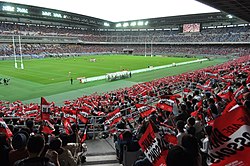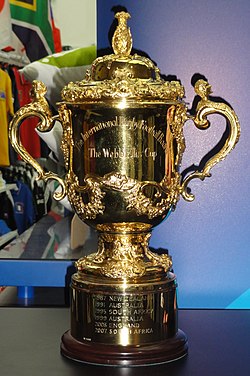2019 Rugby World Cup final
 From Wikipedia - Reading time: 12 min
From Wikipedia - Reading time: 12 min
 International Stadium Yokohama hosted the match | |||||||
| Event | 2019 Rugby World Cup | ||||||
|---|---|---|---|---|---|---|---|
| |||||||
| Date | 2 November 2019 | ||||||
| Venue | International Stadium Yokohama, Yokohama | ||||||
| Man of the Match | Duane Vermeulen (South Africa) | ||||||
| Referee | Jérôme Garcès (France)[1] | ||||||
| Attendance | 70,103 | ||||||
The 2019 Rugby World Cup final was a rugby union match played on 2 November 2019 at the International Stadium Yokohama in Yokohama, Japan. It marked the culmination of the 2019 Rugby World Cup and was played between England and South Africa, a rematch of the 2007 Rugby World Cup final.
The match saw South Africa claim their third Rugby World Cup title with a 32–12 victory, with tries from Makazole Mapimpi and Cheslin Kolbe adding to six penalties and two conversions from Handré Pollard.[2] The official player of the match was South Africa's number eight, Duane Vermeulen.[3]
The match was the United Kingdom's most watched TV broadcast in 2019 with a peak audience of 12.8 million watching on ITV.[4]
Route to the final
[edit]| England | Round | South Africa | ||||||||||||||||||||||||||||||||||||||||||||||||||||||||||||||||||||||||||||||||||||||||||||||||||||||||||||||||||||||||||||||||||||||
|---|---|---|---|---|---|---|---|---|---|---|---|---|---|---|---|---|---|---|---|---|---|---|---|---|---|---|---|---|---|---|---|---|---|---|---|---|---|---|---|---|---|---|---|---|---|---|---|---|---|---|---|---|---|---|---|---|---|---|---|---|---|---|---|---|---|---|---|---|---|---|---|---|---|---|---|---|---|---|---|---|---|---|---|---|---|---|---|---|---|---|---|---|---|---|---|---|---|---|---|---|---|---|---|---|---|---|---|---|---|---|---|---|---|---|---|---|---|---|---|---|---|---|---|---|---|---|---|---|---|---|---|---|---|---|---|---|
| Pool C | Pool stage | Pool B | ||||||||||||||||||||||||||||||||||||||||||||||||||||||||||||||||||||||||||||||||||||||||||||||||||||||||||||||||||||||||||||||||||||||
| Opponent | Result | Opponent | Result | |||||||||||||||||||||||||||||||||||||||||||||||||||||||||||||||||||||||||||||||||||||||||||||||||||||||||||||||||||||||||||||||||||||
| 35–3 | Match 1 | 13–23 | ||||||||||||||||||||||||||||||||||||||||||||||||||||||||||||||||||||||||||||||||||||||||||||||||||||||||||||||||||||||||||||||||||||||
| 45–7 | Match 2 | 57–3 | ||||||||||||||||||||||||||||||||||||||||||||||||||||||||||||||||||||||||||||||||||||||||||||||||||||||||||||||||||||||||||||||||||||||
| 39–10 | Match 3 | 49–3 | ||||||||||||||||||||||||||||||||||||||||||||||||||||||||||||||||||||||||||||||||||||||||||||||||||||||||||||||||||||||||||||||||||||||
| 0–01 | Match 4 | 66–7 | ||||||||||||||||||||||||||||||||||||||||||||||||||||||||||||||||||||||||||||||||||||||||||||||||||||||||||||||||||||||||||||||||||||||
Source: [citation needed]
|
Final standing |
Source: [citation needed]
| ||||||||||||||||||||||||||||||||||||||||||||||||||||||||||||||||||||||||||||||||||||||||||||||||||||||||||||||||||||||||||||||||||||||
| Opponent | Result | Knockout stage | Opponent | Result | ||||||||||||||||||||||||||||||||||||||||||||||||||||||||||||||||||||||||||||||||||||||||||||||||||||||||||||||||||||||||||||||||||||
| 40–16 | Quarter-finals | 26–3 | ||||||||||||||||||||||||||||||||||||||||||||||||||||||||||||||||||||||||||||||||||||||||||||||||||||||||||||||||||||||||||||||||||||||
| 19–7 | Semi-finals | 19–16 | ||||||||||||||||||||||||||||||||||||||||||||||||||||||||||||||||||||||||||||||||||||||||||||||||||||||||||||||||||||||||||||||||||||||
England's final pool match with France was called off on safety grounds due to the impact caused by Typhoon Hagibis; according to tournament rules, the result was declared a 0–0 draw.[5]
England
[edit]
England reached the final after topping their pool with bonus point wins against Tonga, the United States and Argentina. Their final group match against France was cancelled due to Typhoon Hagibis and was recorded as a scoreless draw.[6] In the quarter-finals, England played Australia at Oita Stadium, Ōita. England won 40–16 thanks to two tries from Jonny May and one each from Kyle Sinckler and Anthony Watson, all converted by Owen Farrell, who also added four penalties.[7] In the semi-final at Yokohama Stadium, England played the reigning champions New Zealand. England beat the All Blacks 19–7, breaking New Zealand's 18-match winning streak at World Cups, with a try from Manu Tuilagi converted by Farrell, and four penalties from George Ford.[8] This was England's fourth appearance in a World Cup final, having last been world champions in 2003.[9] They had also reached the final in 1991, when they lost to Australia,[10] and 2007, losing to South Africa.[11] Prior to the final, England called up Saracens scrum-half Ben Spencer as a late replacement for Willi Heinz who had suffered a hamstring injury during the semi-final against New Zealand.[12] England named an unchanged starting team for the final.[13]
South Africa
[edit]South Africa's World Cup campaign began with a loss to New Zealand in their opening match in the pool, but they followed it up with bonus-point wins over Namibia, Canada and Italy to progress in second place in Pool B.[14][15] In the quarter-finals, they played the hosts Japan, winning 26–3 through two tries from Makazole Mapimpi and one from Faf de Klerk, with one conversion and three penalties from Handré Pollard.[16] In the semi-final, they played Wales and won 19–16 due to a converted try from Damian de Allende and four penalties from Pollard, including the match-winner in the 76th minute.[17] This was South Africa's third appearance in the World Cup final, following victories over New Zealand on home soil in 1995 and England in France in 2007.[11] South Africa made only one change for the final with Cheslin Kolbe replacing S'busiso Nkosi on the right wing.[13]
Match
[edit]Summary
[edit]England started as favourites for the final,[18] but they had an unfortunate start to the game as Kyle Sinckler was substituted in the third minute after colliding with Maro Itoje,[19] leaving England with only one tighthead prop.[20] South Africa tight forwards Bongi Mbonambi and Lood de Jager also left the field with injuries in the 21st minute.[21] In the first half, the only points scored were from penalties, with South Africa leading 12–6 at half-time after several handling errors by England,[22] who came close to scoring a try, but did not manage to score after 26 phases.[20]
Two more successful penalties for each side made the score 18–12 early in the second half. Makazole Mapimpi scored the first try in the 66th minute, when he ran in on the left before touching down, making South Africa's lead 25–12 after the conversion. Despite South Africa having won two previous World Cups, he was the first Springbok to score a try in a World Cup final.[20] Cheslin Kolbe followed up with another try eight minutes later, running in from the right wing to make the final score 32–12.[20][22][23]
Details
[edit]| 2 November 2019 18:00 JST (UTC+09) |
| England | 12–32 | |
| Pen: Farrell (4/5) 23', 35', 52', 60' | Report | Try: Mapimpi 66' c Kolbe 74' c Con: Pollard (2/2) 67', 75' Pen: Pollard (6/8) 10', 26', 39', 40'+3', 46', 58' |
| International Stadium Yokohama, Yokohama Attendance: 70,103 Referee: Jérôme Garcès (France) |
England
|
South Africa
|
|
Player of the Match:
Assistant referees:
|
Notes:

- Siya Kolisi (South Africa) earned his 50th test cap.
- François Steyn (South Africa) became the second Springbok player to win two World Cups. The first, Os du Randt, was on the Boks' victorious 1995 team and was also a teammate of Steyn in 2007.[25][26]
- Jérôme Garcès became the first French referee to take charge of a Rugby World Cup final.[27]
- South Africa became the first Southern Hemisphere team to win The Rugby Championship (previously the Tri Nations) and the Rugby World Cup in the same year.[28]
- South Africa became the first team to win the Rugby World Cup having lost a match during the pool stage.[28][29]
- This was the first final in which South Africa scored a try, and the one in which they scored the most points, more than they had in their previous two finals combined. It was also the most points England had scored in a final when finishing on the losing side.[28][30]
- England and South Africa became the third pair of nations to face each other on two occasions in a World Cup final (previously having contested the 2007 final) after England and Australia (1991 and 2003), as well as France and New Zealand (1987 and 2011).
- South Africa is, at 2019, the only nation to have contested at least one World Cup final never to have lost.[28]
- England joined France on a record three losses in World Cup finals.[31]
- This victory meant South Africa climb to the top of the World Rugby Rankings for the first time since 2009, it also meant England dropped to third.[28] South Africa were the fifth team to top the rankings in 2019, with New Zealand, Ireland, Wales and England all reaching number 1 at various points between June and November.[citation needed]
See also
[edit]References
[edit]- ^ "Jérôme Garcès to Referee Rugby World Cup 2019 Final". 9 November 2024.
- ^ "Rugby World Cup: South Africa surge to glory as England fall short". Guardian. 2 November 2019. Retrieved 5 November 2019.
- ^ @rugbyworldcup (2 November 2019). "After a huge game, Duane Vermeulen won the @Mastercard Player of the Match in the Rugby World Cup final Carries 1…" (Tweet) – via Twitter.
- ^ "England's World Cup final loss the most-watched UK TV moment this year". RugbyPass. 3 November 2019.
- ^ "Typhoon Hagibis impact on Rugby World Cup 2019 matches". Rugby World Cup. 10 October 2019. Archived from the original on 4 February 2020. Retrieved 10 October 2019.
- ^ Fordyce, Tom (10 October 2019). "Rugby World Cup: England v France call-off disappointing but correct - Eddie Jones". BBC Sport. Retrieved 27 October 2019.
- ^ Cantillon, Michael (19 October 2019). "England 40-16 Australia - Match Report". Sky Sports. Retrieved 27 October 2019.
- ^ Fordyce, Tom (26 October 2019). "England 19-7 New Zealand: Eddie Jones' side beat All Blacks to reach World Cup final". BBC Sport. Retrieved 27 October 2019.
- ^ "England win Rugby World Cup". BBC Sport. 22 November 2003. Retrieved 27 October 2019.
- ^ "1991: Wallabies pip England". BBC Sport. 24 September 2003. Retrieved 27 October 2019.
- ^ a b Standley, James (20 October 2007). "World Cup final 2007". BBC Sport. Retrieved 27 October 2019.
- ^ "England summon Ben Spencer for dramatic Rugby World Cup final call-up". The Guardian. 27 October 2019. Retrieved 27 October 2019.
- ^ a b Flood, George (31 October 2019). "Latest England vs South Africa team updates". Evening Standard. Retrieved 31 October 2019.
- ^ "New Zealand stand firm against South Africa in heavyweight thriller". Guardian. 21 September 2019. Retrieved 30 October 2019.
- ^ "Pools". World Rugby. Archived from the original on 28 August 2019. Retrieved 27 October 2019.
- ^ "Japan 3 - South Africa 26". BBC Sport. Retrieved 27 October 2019.
- ^ "Wales 16-19 South Africa". BBC Sport. 27 October 2019. Retrieved 27 October 2019.
- ^ Pentony, Luke (31 October 2019). "Rugby World Cup final favourites England with the pressure on them ahead of South Africa clash in Japan". ABC News. Retrieved 3 November 2019.
- ^ Del Carme, Liam (2 November 2019). "Champions of the World! Boks beat England and conquer the planet". Sport. heraldlive.co.za. Herald Live. Retrieved 4 November 2019.
- ^ a b c d de Menezes, Jack (2 November 2019). "England lose Rugby World Cup final to South Africa". The Independent. Archived from the original on 2 November 2019. Retrieved 3 November 2019.
- ^ Houwing, Rob (2 November 2019). "Bok ratings: Our collective of HEROES!". Rugby World Cup 2019. sport24.co.za. sport24. Retrieved 4 November 2019.
- ^ a b Fordyce, Tom (2 November 2019). "England 12-32 South Africa: Springboks win World Cup for record-equalling third time". BBC Sport. Retrieved 3 November 2019.
- ^ "Rugby World Cup: South Africa surge to glory as England fall short". Guardian. 2 November 2019. Retrieved 5 November 2019.
- ^ a b c "Jérôme Garcès to referee Rugby World Cup 2019 final". Rugby World Cup. 29 October 2019. Retrieved 4 November 2019.
- ^ "Rugby World Cup final: Frans Steyn's memories of late loved ones drove him to become a dual champion". 2 November 2019.
- ^ "Dominant Boks repel England before flying wingers strike to seal world title No.3 | Rugby World Cup". 9 November 2024.
- ^ "Frenchman Jérôme Garcès to referee Rugby World Cup final". Guardian. 29 October 2019. Retrieved 30 October 2019.
- ^ a b c d e "Rugby World Cup final: South Africa break records and beat All Blacks to milestones". stuff.co.nz. 3 November 2019. Retrieved 3 November 2019.
- ^ "South Africa Crushes England in Rugby World Cup Final". The New York Times. 2 November 2019. Retrieved 5 November 2019.
- ^ "RWC 2019 - 10 Records That Were Broken". Americas Rugby News. 2 November 2019. Retrieved 5 November 2019.
- ^ "England 12-32 South Africa: Springboks win World Cup for record-equalling third time". BBC Sport. 2 November 2019. Retrieved 5 November 2019.
 KSF
KSF
